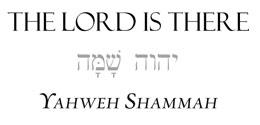Praying the Names of God - December 1
From Praying the Names of God Week Twenty-Five, Day One

The Name
Strictly speaking, Yahweh Shammah is a name for a city rather than a title of God. But it is so closely associated with God's presence and power that it has often been equated with a name for God, at least in popular parlance. The name in the New Testament that is most closely associated with it is Immanuel, "God with us," a name that was given to Jesus. Yahweh Shammah (yah-WEH SHAM-mah), "The LORD is there," reminds us that we were created both to enjoy and to manifest God's presence..
Key Scripture
And the name of the city from that time on will be: THE LORD IS THERE. (Ezekiel 48:35)
***
Monday
GOD REVEALS HIS NAME
I will gather them from all around and bring them back into their own land. I will make them one nation in the land, on the mountains of Israel. There will be one king over all of them and they will never again be two nations or be divided into two kingdoms. They will no longer defile themselves with their idols and vile images or with any of their offenses, for I will save them from all their sinful backsliding, and I will cleanse them. They will be my people, and I will be their God.
My servant David will be king over them, and they will all have one shepherd. They will follow my laws and be careful to keep my decrees. They will live in the land I gave to my servant Jacob, the land where your fathers lived. They and their children and their children's children will live there forever, and David my servant will be their prince forever. I will make a covenant of peace with them; it will be an everlasting covenant. I will establish them and increase their numbers, and I will put my sanctuary among them forever.
My dwelling place will be with them; I will be their God, and they will be my people. Then the nations will know that I the LORD make Israel holy, when my sanctuary is among them forever. . . . And the name of the city from that time on will be: THE LORD IS THERE. (Ezekiel 37:21-28; 48:35)
Lord, arise and come to your resting place. Let your glory dwell with your people.Hear from heaven and forgive our sins. Lead us and guide us. Fill us with your presence by the power of your Spirit. May your eyes and your heart always be upon us. Establish your sanctuary among us forever. Amen.
Understanding the Name
Genesis is the story of beginnings. For a short while, it portrays an easy intimacy between God and the man and woman he made. But as soon as sin enters the picture, that intimacy is destroyed. Sensing that sin has rendered them unfit for God's presence, Adam and Eve try to hide. But God finds them and casts them out of paradise, barring the way back.
Nevertheless, he doesn't entirely abandon sinful humanity. Instead God begins to reestablish his relationship with them. He starts by choosing a people for his own. Then he delivers his people from their slavery in Egypt, as Deuteronomy 4:37 says, "by his Presence and his great strength." God dwells with his people first in the form of a pillar of cloud and fire, then in the movable tabernacle in the wilderness, and later in the Jerusalem temple.
But still God's people sin. Tragically, the prophet Ezekiel witnesses the glory of God departing from the temple because of their continued unfaithfulness. God is no longer there. Despite God's absence, the book of Ezekiel ends on a note of tremendous hope, predicting a time of restoration, when "the name of the city from that time on will be: THE LORD IS THERE."
Studying the Name
- British preacher Charles Spurgeon once said that "whenever it can be said of an assembly, ‘The Lord is there,' unity will be created and fostered. Show me a church that quarrels, a church that is split up into cliques, a church that is divided with personal ambitions, contrary doctrines, and opposing schemes, and I am sure that the Lord is not there."1 How have you experienced unity as a mark of God's presence in your church and in your home?
- What are other marks of God's presence?
- What is the connection between keeping God's laws and living in his presence?
- How do you experience God's presence in your life?
Check out Ann's newest books on AnnSpangler.com. To hear more from Ann Spangler, sign up today at annspangler.substack.com.
Meet your spiritual ancestors as they really were: Less Than Perfect: Broken Men and Women of the Bible and What We Can Learn from Them.






